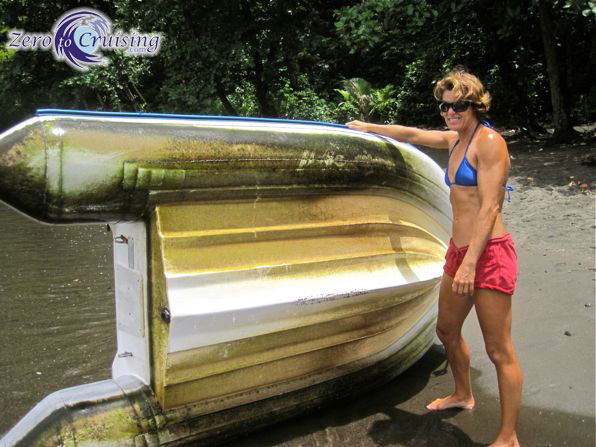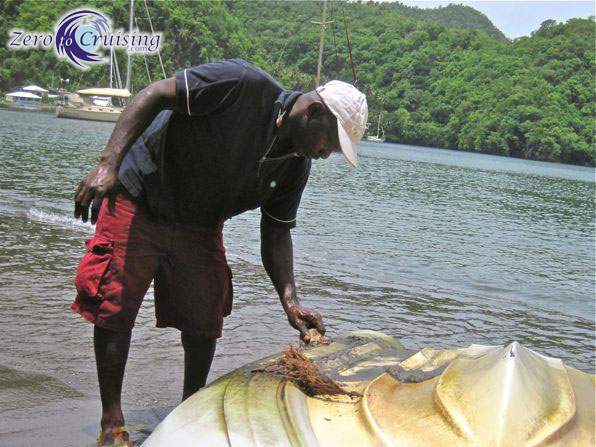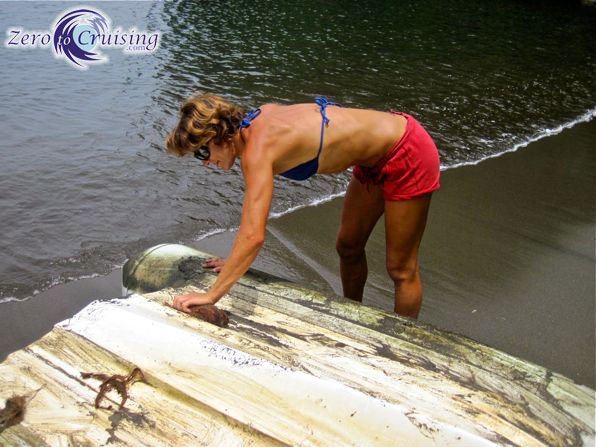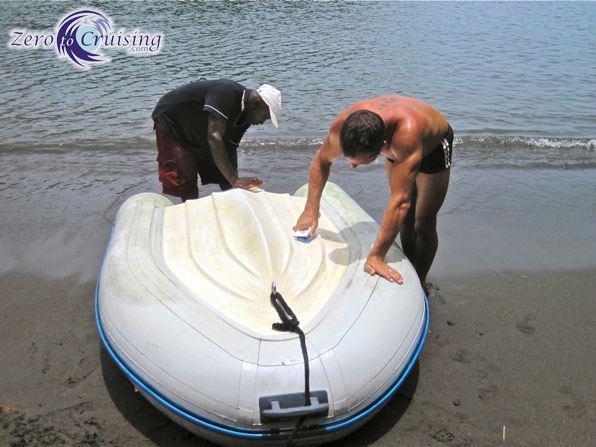Coconut husks, friendly people and fresh fish!
I know the photo of our dinghy that I posted yesterday, with its very dirty waterline, offended the eyes of the perfectionists who read our blog. Even I’ll admit that the waterline, and the bottom that you couldn’t see in the pic, was pretty gross. It’s kind of surprising too considering that we raise the dinghy into the davits every night! Anyway, the Mother’s Day reprieve from chores was over and since it was looking so nasty, we decided that ticking “clean dinghy bottom” off of our long to-do list had moved up in priority. When we made our way over to the beach to do it though, the last thing we were expecting was a lesson in a new-to-us eco-friendly* method of completing the task!
Only seconds after we had removed the engine from the dinghy and flipped it over to begin cleaning it, Brother, the helpful local who fixed our outboard the other day, yelled to us and came over to say Hi. When he figured out what we were going to be doing, he told us that we could use coconut husks and sand for the job. Just as it did the other day, my bewildered look must have struck him as a plea for help. Not only did he go on to show us how to use the items that were lying at our feet to remove the barnacles and grime from the inflatable’s bottom, he spent almost an hour scrubbing it along side us! Why? Why does anyone do good deeds?


Throw some wet sand onto the hull and then scrub it with a piece of coconut husk. Voila!



Later in the afternoon one of the boat boys, Ackneil, the young man who helped us with our stern line when we first arrived here, mentioned to us that he was having issues with the spark plugs in his outboard. Because we have a similar engine that uses the same ones, I offered him a couple of plugs that we had recently swapped out of our Yamaha (we keep the ‘old’ plugs that we replace after a certain number of hours, just in case). A little while later he came back and gave us a little fish that he caught in order to say thank you. How cool is that? We had the fish for dinner and it was very tasty!

*Hopefully using an eco-friendly method to clean the bottom of our dinghy will bring me back into the good graces of any environmentalist who I might have upset with my fuel-spilling indiscretion. 🙂


Outstanding, we’ll have to jot this one down……and you gotta love paying it forward!
It worked remarkably well. At least as good as anything we have done in the past, with no chemicals.
Even I had forgotten that coconut husks and sand work very well. The greener the better.. Your bottom looks great! 😉
Thank you! Or did you mean the dinghy’s bottom? 😉
Great tip, and so nice to hear about people helping others … just because!
One of the real pleasures of cruising is meeting people like that!
I love learning new things from people… and how the kindness circle spread out that day… from the coconut husks to spark plugs and a fish dinner.
Take care you two…
Rainey
Thanks Rainey. I think we are still learning something new just about every day we are out here.
Ok, I’ll bust the eco love bubble. Asking Mike and the knowledge that follows. What would spraying a “Scotch Guard” substance on the bottom of a clean or even new dinghy do? Would you end up like Clark Griswold in Christmas Vacation when he sprayed the lubricant on the sled/disk? Hmmm, if you put enough water repallant on the bottom would it levitate? LOL
Back to the seriousness of the question. Would Scotch Guard help keep funk off the bottom better?
Cameron, if it was as easy as that we would all be putting Scotch Guard on the bottom of the main boat. Anti fouling paint is very expensive and not necessarily very effective. Any good alternative would be welcomed. Somehow I don’t think your undoubtedly good idea would work too well, even on a dinghy. Pity really.
Mike
Antifouling paint = $$$
I am amazed how mucky it was despite you picking it up every night. How long was it since its last scrub?
Mike
We’re pretty sure it was back in Grenada, 5 or more months ago.
I must of missed a post or been out to lunch…I never knew you had a hard bottom……Your dinghy that is! When locals help you with cleaning or your engine, do you give them anything to say thank you?
The RIB was purchased used in Florida, off Craig’s List.
Do we give them anything? Respect and thanks most assuredly. A beer if it’s appropriate. I am often torn about offering anything monetary because in my opinion, it lessens the value of the “gift” if we pay for it. If there is an obvious service being done with a reward expected, and it was agreed upon before hand, then we pay. And frequently we have people try to make us indebted to them by doing things we don’t wish to pay for, such as “guarding” our dinghy at the dock, something which occurred today which was totally unnecessary. The situations I just wrote about though were not transactions, they were gifts of time and friendship. You don’t pay your friends when they do nice things for you. You reciprocate in kind when possible.
I recently read a book that said if you offer money for a favor you’re more likely to get turned down. It basically turns the motive from an altruistic one to a job (very simplified explanation, but the best I could comprehend it 🙂 ). So if you offer a buddy 20 bucks to help you move he’ll probably say no, but if you offer to buy the pizza and beer he’ll help haul stuff all day.
Hey, Chuckd, what do need help moving? I’m available.
🙂
Makes sense to me.
Hey John – this seems to be the only place I can contact you now. Was it something I said?
John is flighty like that. 🙂